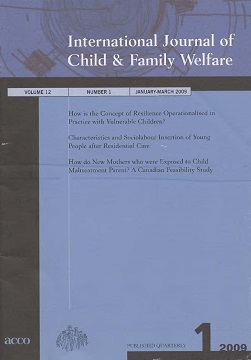How do New Mothers who were exposed to Child Maltreatment Parent? A Canadian Feasibility Study
Keywords:
child maltreatment, mother-child interactions, parenting, salivary cortisolAbstract
The primary objective of this study was to identify challenges in the identification of the sample, enlistment and recruitment of participants, and the feasibility of measures examining parenting in new mothers with a history of maltreatment in childhood. Participants were thirty first-time mothers, unselected for maltreatment history, and their three-month-old infants. We examined mothers' own history of child maltreatment in relation to emotional well-being, maternal warmth and sensitivity, and neuroendocrine activity in both mother and child. Mothers who reported experiencing maltreatment in childhood scored higher on self-reported Eysenckian psychoticism and rated their infants higher on distress to limitations than did mothers who did not report maltreatment in childhood. Mothers higher on emotional well-being exhibited greater decrease in salivary cortisol and reported more smiling and laughter in their infants. Feasibility issues are examined that stand to inform the design of future studies on a larger scale.

